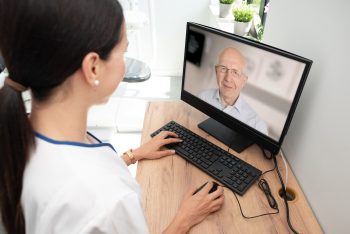Home / Health & Wellness Articles / Mental Health /
What is telehealth and how does it work?

The ongoing COVID-19 pandemic has resulted in mass quarantining around the world. Since such measures began, the increased isolation has led to a significant rise in mental and physical health challenges that still need professional medical attention. In turn, there is a growing demand for telehealth appointments. Telehealth connects clients to health care services through videoconferencing, remote monitoring, electronic consults and wireless communication. Currently, more than 15 percent of patients in the U.S. are utilizing telehealth.
In this new age of technology-based health care, providers are learning to adapt to this new medium in serving their clients. Telehealth is organized through videoconferencing platforms such as Zoom, MDLive, SnapMD and others. Telehealth might look different to the client depending on state laws, but the overall process is still the same. At Centerstone there are services offered that vary by state, but the most common services provided are outpatient counseling, therapy (whether it is individual, group or family sessions) and some types of medication management.
Centerstone’s call centers and schedulers provide support to clients and providers in their journey to care. Our team members offer communication about scheduling, telehealth education and test sessions, and they can provide technical instructions for your telehealth experience. The basic process for Centerstone’s telehealth service for a new client is: a client calls to request an appointment; the call center will schedule your appointment; a link to your appointment is sent to you by email or text, and then you can join your appointment through Zoom.
In many situations, there are great benefits that come with telehealth services rather than in-person care. These include:
- Accessibility. Telehealth clients save time and even money by not driving or arranging transportation to appointments and waiting to be seen. Now they can log in for a mental health care appointment from the comfort of their own homes.
- Safety from illness. Whether it’s COVID-19 infection rates, cold and flu season, or you’re feeling a little under the weather but don’t want to miss an appointment, there are often good reasons for social distancing. Telehealth presents a way to keep clients and providers safe from illness by having sessions virtually.
- Convenience. Knowing that you can make it to your appointment from the comfort of your home may help alleviate any stress toward receiving care. Clients are more likely to show up for appointments when there are no barriers in place such as traffic and time conflicts.
- Provider options. With easier access to care and fewer geographical limits, there are now more available providers to choose from. If one provider isn’t a good fit, you have increased options available to find the right person for you.
While suitable for many behavioral health needs, telehealth isn’t right for everyone. If you have limited access to technology it can create another barrier to receiving the care you need. Talk to your providers to see what care options might benefit you the most.
If you or someone you know is struggling with their mental health, Centerstone can help. Call 1-877-HOPE123 (1-877-467-3123) for more information.


